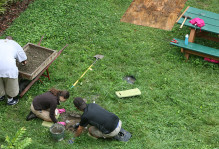W&M Takes Center Stage in National Service Movement
In June 2012, in an interview conducted at the Aspen Ideas Festival General Stanley McCrystal commented that citizenship in our country has atrophied. McCrystal suggested increasing national service opportunities for our 18- to 28-year-old citizen cohort as one solution to the deterioration of our sense of connectivity. General McCrystal’s idea resonated with many in the audience. Within a year’s time the Franklin Project was announced at the Aspen Institute in June 2013. At the Summit, leaders from an array of sectors including non-profit, government, corporate, higher education and others began to make commitments to the Franklin Project.
Last week the governor and first lady of Virginia convened Virginia college and university presidents, members of their staffs, students and others at the William & Mary for the purpose of considering higher education’s role in a service year. John Bridgeland, Co-Chair of the Franklin Project, encouraged attendees to consider new ways to support the service year. Uniting higher education and the Franklin Project would create a natural link between the mission and vision of our colleges and universities and our nation’s great need for a renewal of citizenship. Preparing young adults for community engagement is the aim of our most forward-thinking schools. For example, the president of James Madison University has spearheaded a university-wide shared vision for JMU to be the national model for the engaged university, William & Mary’s vision statement concludes, “people come to William & Mary wanting to change the world — and together we do.” Many others seek to inspire a lifelong commitment to the benefit of the common good.
One-third of American adults are now earning bachelor’s degrees. By acknowledging the role of colleges and universities in the formation of social networks that influence civil discourse, it becomes clear that these institutions should become a place where long-lasting relationships with diverse others can be established. If our nation’s colleges and universities do more to encourage a commingling of students with liberal and conservative leanings, students would begin their service year with developed skills in discourse, civility and understanding. General education courses aimed at addressing controversial topics with civility could have long-term transformational effects well beyond the college setting.
Might a service year emerge as a counterweight to the growing divide between citizens who have vastly different expectations for the future of our country? And, might colleges move more closely toward their great aspiration: to cultivate an engaged and enlightened citizenry where understanding and appreciating differences as essential to a flourishing democracy is the goal?
Colleges and universities can help prepare citizens for the challenges and opportunities related to working in their community by developing new programs and structures that meet their civic-minded vision and mission. In doing so, many of the one million young adults fully immersed in community will be equipped with the tools to foster connectivity and to embrace diverse perspectives. The Franklin Project can be a part of the solution to our national conundrum of failed common citizenship and higher education can play a role in preparing many of the service year participants for the challenge.



No comments.
Comments are currently closed. Comments are closed on all posts older than one year, and for those in our archive.